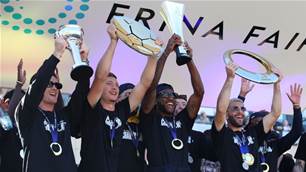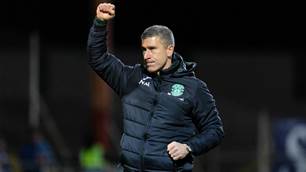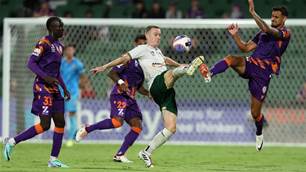Football is not just about 22 people running around a pitch for 90 minutes. It takes a hell of a lot of work to make football happen and, at amateur level, the game is sorely dependent on way too small a group of time-poor individuals.
Avoca Beach is a sleepy little seaside town an hour north of Sydney. There’s a strong artistic community but, apart from that, not a lot happens beyond the sporting clubs which are chiefly the Surf Club (which has always punched above its weight in national competition), the Rugby Club (which won NSW club of the year just a few years ago), and the Football Club.
The Football Club has the most active members (players) but by far the lowest profile. Formed in 1995, the club doesn’t even have its own home ground – mainly because land in Avoca is too valuable to be turned over to new parks so the 900+ players in 40+ teams have to train and play all over the Central Coast. The Men’s Premier League team trains at Point Clare – 30 minutes drive away – adding an hour to an already tight schedule for people leading adult lives with uni, jobs and sometimes kids to look after.
Besides the lack of facilities, the Avoca Football Club suffers from all the other problems most small town clubs have – mainly a lack of resources, but even worse: too few people with enough time and commitment to take on the myriad functions needed to keep the club going. Outgoing club President, Mark Norris, reckons he has the same number of officials looking after 900 players as he did a few years back when there were only 200!
Mark himself has carried a ridiculous load – everything from governance and dealing with the Association to field marking and running the sausage sizzle – every weekend for donkey’s years. That’s on top of earning a living and supporting his family! Of course he’s not the only one – there are thousands of similar people across Australia going way beyond the call of duty for their communities. Holding their clubs together because no-one else will.
To all of them, I say: thank you and invite readers of this article to list below the names of other Mark Norrises out there who’ve gone beyond the hard yards and deserve a mention.
But back to Avoca FC…
There has been a very interesting transition on the park over the last few years that is testament to the strong culture growing there. The senior Men’s team (playing in the Central Coast Premier League) has never been particularly competitive. There are only two divisions of Grade Football on the Central Coast – Premier League and Division 1. More often than not Avoca has been in Division 1 and the couple of times in the past they made the top grade they went straight back down – the archetypal yoyo club.
However, since they last won promotion in 2014, they have yet to be relegated and this year finished equal fourth – missing the semis only on goal difference after beating three of the top four clubs in the last month of the season. Next season, Avoca will be genuine contenders for the title.
No-one could ever have said that about Avoca FC in the past. I myself used to be one of the Avoca Premier League coaches and in my day we’d flog our guts out in pre-season, train hard two nights a week, lay out a careful plan to take the opposition apart strategically – and then stare in disbelief as our team turned up on a Sunday afternoon, badly hungover and still in their disco gear (after promising the previous week never to do that again).
Clearly, something has changed. I spoke with Chris Bellingham – one of the player-coaches to get a few clues.
Chris: Knighty…Shane Knight arrived at the club in 2014. He’d played for Bonnyrigg and Edgeworth Eagles and brought that serious professional approach which all the young blokes really bought into.
AD: What does professional approach mean?
Chris: It starts with being healthy. The players certainly enjoy a beer but they never go mad during the season. We get fit, we stay fit, and we turn up for every game properly prepared to play.
AD: Prepared to play? Fascinating...so if the players enjoy a beer, when can they have one (or several)?
Chris: We always get together after the game. The social side of things has become very strong over the last few years.
AD: (Aware that, in the past, the social side of things was the problem) It wasn’t strong before?
Chris: It could’ve been stronger. I grew up in Dubbo where your social life was completely centred on the sporting clubs. The games were taken seriously but were really just a prelude to the social side of things. That’s really improved at Avoca in the last few years and all the young blokes coming through are really keen to be part of it. Kids in the junior teams actually look forward to playing grade when they grow up.
AD: So how does that strong culture play out on the pitch?
Chris: We only accept players who respect the club, the team and its values. We don’t have any stars so we have to win through teamwork and teamwork starts with commitment to the team.
AD: No stars? Avoca won Central Coast player of the year for the last two seasons…Shane Knight and Stuart Adams!
Chris: Okay, no stars apart from them.
I also spoke with Gerhard Raftl, one of the small original crew that set up the club with just one Men’s team and a couple of kids’ teams back in 1995.
Gerhard: Yes, the club culture has improved out of sight in the last few years but it grew out of the base that was set up through the hard work and dedication of the original group and others who’ve come in since…people like Ray Collins, Justine Martin and the Brooks family. There have been a number of times when it would have been easier to just let the club die but someone would always do whatever had to be done…a ridiculous amount of work or stick their hand in their own pocket to keep the club afloat. It’s having survived that kind of stuff that provides the bedrock for the Avoca culture now.
AD: So who benefits?
Gerhard: The culture affects the whole club. It’s not just the Premier League. We’ve had huge growth in women’s teams and Sam Panetta was just voted Central Coast Women’s Coach of the Year. But no matter the dedication of individuals off the pitch, club culture has to be grounded in your football department because football is what the club is for. We’ve got a great coach, but we’ve had some other people who’ve made a massive technical contribution…like Paul Fox (ex Aston Villa). We’ve been very lucky with some of the contributors we’ve had…all putting in their time and effort for nothing. Just wanting to be part of what we’ve created.
That creation is really getting up a head of steam now as the wider community starts to take notice. Back when I was involved with the Men’s Premier League you’d maybe have 60 people on the sideline watching the first grade match – and they’d mostly be players from the lower grades and a smattering of longsuffering girlfriends and parents.
Chris: Crowd? It’s mad. There’d have to be 100 on the sidelines now for reserve grade and by kick off in first grade we sometimes have up to 300. There are people coming now with no personal connection with the team. They’re just part of the community and love their football.
AD: Three hundred? Those are incredible numbers for amateur football, especially in regular season.
Chris: And it really lifts the players. The noise they make...you can actually imagine what it must be like to play as a professional in front of thousands. That would be amazing, but we’re getting just a teensy little taste, and once again it comes back to the culture.
The bewildering thing is, despite the fabulous culture that has grown so strongly, the club remains vulnerable to all the usual problems confronting amateur sports clubs – the main one being an over-reliance on key individuals in the off field roles. And incredibly, there are people who will whinge about the club despite never having done a thing themselves other than pay their kids’ fees. That must be soul destroying for the people giving up too much of their time to keep the club going.
Gerhard: It burnt me out for a while, but I’m almost ready to go back and help out in some capacity. I wouldn’t mind getting back into some junior coaching.
AD: Do you miss coaching the Premier League?
Gerhard: I do, but it’s important to know when to step aside and let someone else have a go. Sometimes that's the only way to make headway. Shane has done an unbelievable job…it’s no wonder people want to play for him. I think we’re really building towards something pretty special next year.
So there you have it. A sneak peek behind the scenes at one of the many thousands of amateur clubs in Australia. Change the names and it could be telling the same story at just about any of them.
I guess the main take-away point is this: get involved. If you can manage a little bit of time – give it to your local club because the administrative burden falling on too few people can be crippling. But the rewards are huge. Being part of a club with a good culture is endlessly fulfilling – and if your club doesn’t have such a good culture?
It’s up to you to change it.
---------
Adrian’s latest book Political Football: Lawrie McKinna’s Dangerous Truth is in the shops right now or available through Booktopia. Adrian also wrote Mr Cleansheets.
Related Articles

A-League clubs in peril as APL prepares to wield financial axe

Wanted Monty puts Hibernian hurt behind him amid offers from Asia and Europe












